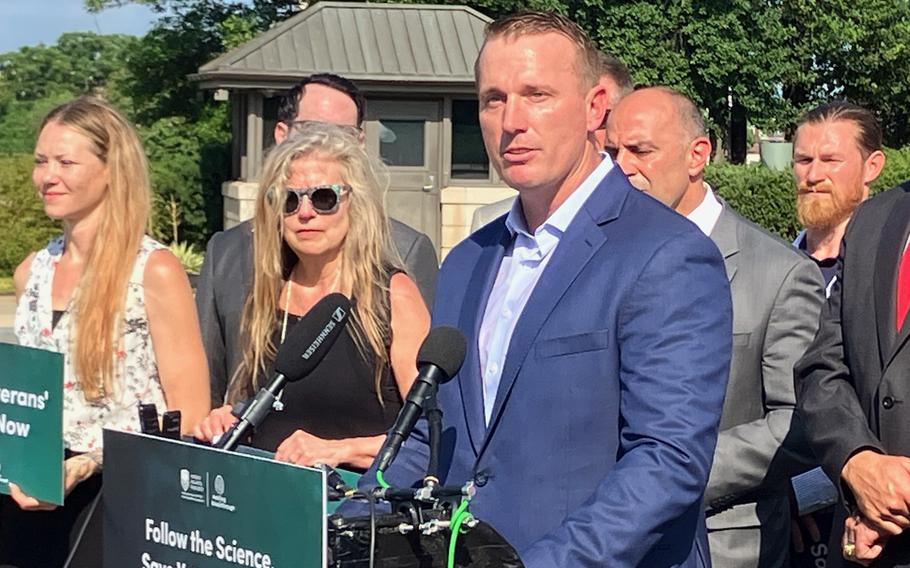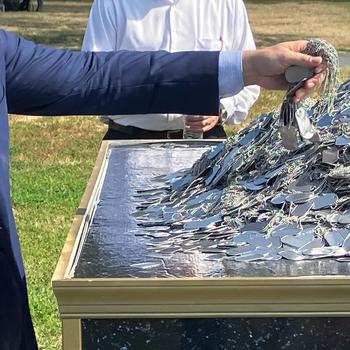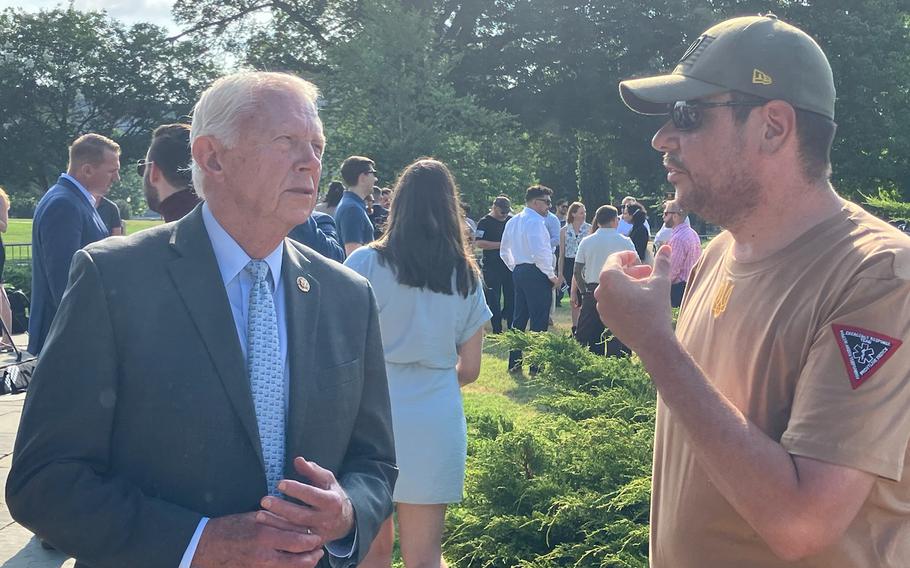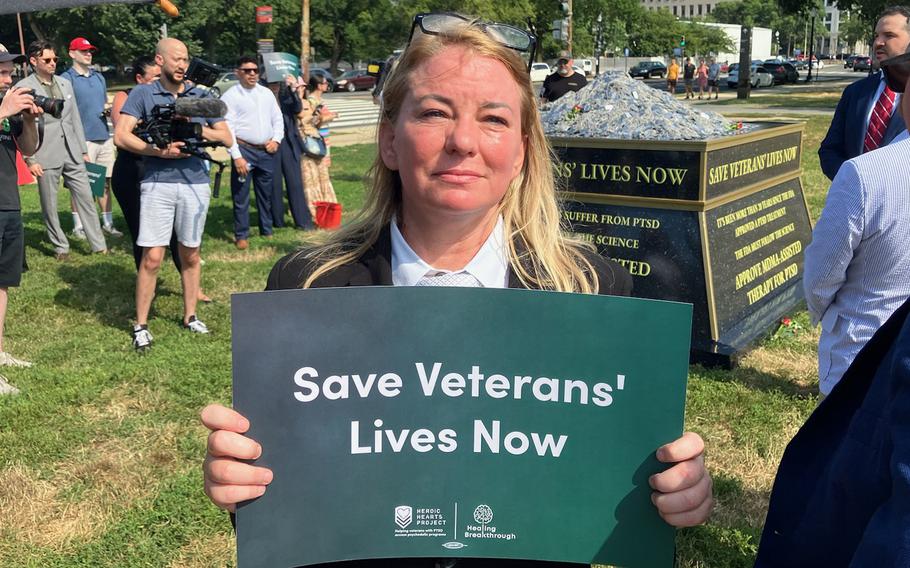
Dakota Meyer, Marine Corps veteran and Medal of Honor recipient, speaks at a news conference in Washington on July 10, 2024. (Linda F. Hersey/Stars and Stripes)
WASHINGTON — Medically retired with post-traumatic stress disorder, Jonathan Lubecky, a Marine Corps and Army veteran, said the anti-depressants and other prescribed medication that he took for his illness did little to ease his nightmares, flashbacks and thoughts of suicide.
Lubecky, a former sergeant who served in Iraq, said the only treatment that addressed his PTSD — a psychological disorder caused by trauma — was a four-month protocol of the hallucinogenic drug MDMA, commonly known as ecstasy, that he took in a clinical trial for the drug.
PTSD often afflicts military members and veterans who have been in combat and other life-threatening situations.
Lubecky, 47, shared his experience at a news conference Wednesday to call attention to veteran suicide and a decision by the Food and Drug Administration expected next month on whether to allow MDMA — a Schedule 1 drug — for clinical use in treating PTSD.
Veterans advocacy groups — including the nonprofits Healing Breakthrough and Heroic Hearts Project — along with several lawmakers who are veterans attended the two-hour outdoor news conference in the nation’s capital, which included a large display of 150,000 dog tags to represent the number of veterans who have died by suicide since 9/11.
“MDMA-assisted therapy saved my life. I wouldn’t be here today if I had not had it,” said Lubecky, who participated in clinical trials with Lykos Therapeutics, which is attempting to get FDA approval for the first-ever MDMA treatment.

A display of 150,000 dog tags to represent the number of veterans who have died by suicide since Sept. 11, 2011. (Linda F. Hersey/Stars and Stripes)
Veterans with PTSD are at a higher risk for suicide than those without the diagnosis, according to research by the Department of Veterans Affairs.
“I’ve lost more brothers and sisters than I care to think about,” said Juliana Mercer, a Marine corps veteran who spoke at the news conference.
Today, she directs public policy at Healing Breakthrough, which supports adoption of MDMA-assisted therapy for the treatment of PTSD and traumatic brain injuries in veterans.
Mercer, who deployed to Iraq and Afghanistan during 16 years of military service, said she found benefits in receiving MDMA-assisted therapy as a veteran.
“I returned from combat with wounds that were not visible,” said Dakota Meyer, a Marine Corps veteran and Medal of Honor recipient who served in Iraq and Afghanistan during four years of military duty. “I had nightmares, anxiety. I was trapped in my mind.”
He said the MDMA therapy was the only treatment that effectively addressed his PTSD.

Marine Corps and Army veteran Jonathan Lubecky, right, speaks with Rep. Jack Bergman, R-Mich., following a news conference in Washington on July 10, 2024. (Linda F. Hersey/Stars and Stripes)
The FDA is expected to issue a decision by Aug. 11 on the drug company’s proposal for MDMA-assisted therapy, which involves a patient taking prescribed doses of the drug under the supervision of a clinician while simultaneously receiving psychological counseling.
“Our nation is facing a suicide crisis among our veterans,” said Rep. Jack Bergman, R-Mich., a retired Marine Corps lieutenant general and Vietnam veteran, who also spoke at the news conference.
Bergman pointed to a recommendation by an FDA advisory panel last month against approving MDMA-assisted therapy.
“I was disappointed and frustrated by the advisory panel’s recommendation,” he said. “The panel ignored the voices of veterans.”
But the VA has stated it will consider integrating MDMA-assisted treatment into its health care services pending FDA approval, said Rep. Lou Correa, D-Calif.
“Can I have a hand of those veterans that have gone through this therapy and see that it has saved their lives?” Correa asked.
Several veterans in the crowd raised their hands.
“We’ve seen our nation’s veterans suffer suicide and opioid overdose deaths, and the VA must do all it can to ensure safe, scientifically sound access to potentially lifesaving therapies as soon as possible,” said Correa, co-founder of the Congressional Psychedelics Advancing Therapies Caucus in Congress.
The caucus supports legislation for advancing clinical research on psychedelics in treating “brain health conditions.”

Army veteran Lynn Krug holds a sign in support of veterans’ mental health care at a news conference in Washington on July 10, 2024. (Linda F. Hersey/Stars and Stripes)
Rep. Morgan Luttrell, R-Texas, a former Navy SEAL, said he understands the idea of FDA approval for a psychedelic drug alarms people.
Luttrell said he was worried too when he sought MDMA-assisted treatment outside the country after retiring from the military to ease the nightmares, angry outbursts and negative thoughts that he was experiencing from PTSD and a traumatic brain injury.
“Yes, I’ve done this, and yes, I support this,” Luttrell said, referring to his experience using psychedelic-assisted therapy. “Psychedelic therapies are not only a viable option, but a necessary path forward to treat combat-related cognitive injuries.”
Lubecky said he first learned about clinical trials that Lykos Therapeutics was launching in 2014.
After his fifth suicide attempt, Lubecky said he met with a medical intern at the VA medical center in Charleston, S.C., as he waited to see a psychiatrist. The intern urged him to try psychedelic therapy as an alternative treatment.
“I took MDMA only three times in a very tightly controlled setting, after enrolling in the Lykos clinical trials. I had two specially trained therapists at my side the entire time,” he said.
Lubecky said his PTSD symptoms abated completely in less than six months after the therapy. Today, Lubecky said he volunteers with Frontline Medics, a humanitarian aid organization that does outreach in Ukraine.
Lynn Krug, an Army veteran from Texas, also attended the news conference. Krug, who served from 1995-2001, said she suffered multiple head injuries that included percussion trauma from exploding grenades during military training.
She said she has received MDMA-assisted treatment several times outside the country that has eased the long-term effects from her brain injuries, including severe headaches, sleeplessness and ringing in her ears.
“I turned to psychedelic-assisted therapy after the VA said there was nothing else that could be done to relieve my symptoms,” she said. “I was given a hug at the VA and told that there were no medical treatments left for me. MDMA may not be for everyone. But it is a solution that has worked for me.”